A large number of people around the world play football. A smaller group play professionally and an even smaller bunch win trophies and honours. But only a handful of people will ever have a stadium named after them.
A number of stadiums around the world have been re-named over the years due to corporate sponsorships deals. But a few traditional clubs have re-named their respective stadiums in recognition of former servants of the clubs for their achievements.
Here, we take a look at five great footballers who have had stadiums named in their honour.
Santiago Bernabeu
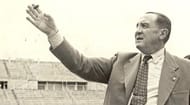
Santiago Bernabeu, born in 1895, was a former Real Madrid player, manager and president. One of the most important men in the history of the club, Bernabeu served as Madrid's president until the day of his death in 1978, after which the club's stadium was named in his honour.
Real Madrid, in the 1920s during Bernabeu's playing days, were a small club with a modest goal for the future. However, post World War II and Spain's internal civil conflict, organised football began to take shape again.
After a stint in the army during the war, the legendary figure sought to restructure the club and he earned a place on the board after years of service. He oversaw the transformation of the club with visionary ideas that still shape the world of football today.
The Madrid-born football fanatic, Bernabeu assembled a team of world beaters in the 50s and 60s that helped mould Real Madrid's image as a European giant. Bernabeu helped build the stadium that bears his name today, along with structuring the club's training programs and methods.
Real Madrid would not be the Real Madrid of today without Santiago Bernabeu.
Ferenc Puskas Stadion
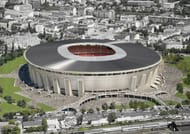
Former Hungarian player and manager, Ferenc Puskas, is widely considered one of the greatest European footballers of all-time. Part of Hungary's golden generation, Puskas almost averaged a goal a game for Hungary, scoring 84 goals in 85 appearances for the national side.
The FIFA Puskas Award, established on 20 October 2009 in honour of the Hungarian wizard, is awarded to the player, male or female, judged to have scored the most aesthetically significant, or most beautiful goal of the year.
1954 WC runner-up and multiple time European champion with Real Madrid, the Hungarian cemented his name in football history with some spellbinding performances during his career, leaving audiences dumbstruck at the skill and pace of the tiny forward.
Born in 1927, Puskas managed a host of football teams across the globe after his playing days. In 2002, the national football stadium in Budapest, Hungary was re-named after the country's most prolific goalscorer Ferenc Puskas.
Formerly called the People's Stadium, the Ferenc Puskas Stadion is a multi-facility stadium that can be rented out for large events, mainly football.
Johan Cruyff Arena
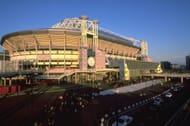
The greatest Dutch footballer of all-time, with three Ballons d'Or to his name, Johan Cruyff is fondly remembered for his overall contributions to football. The Dutchman also started the Cruyff Foundation, guiding, educating and helping the younger generation aspire to lead their lives through sport.
The pioneer of Total Football, Cruyff began his playing and managerial reign at Ajax but resonated with the world with his work at Barcelona where he structured the developmental methods for the famous La Masia youth system, based on his footballing ideology.
On 25th April 2017, Ajax announced that it would rename its home stadium from the Amsterdam Arena to the Johan Cruyff Arena, in memory of their club legend who passed away a year earlier in March.
A winner of three consecutive European Cups as a player with Ajax in the early 70's, the Dutch tactician also managed Barcelona to the Champions League trophy in 1994, ending the club's long wait for a European trophy.
The Cruyff legacy will live on through the ages as no other footballer has fundamentally changed the way football is played like the Dutch master has.
Diego Maradona
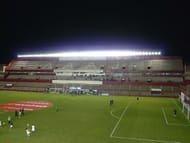
Diego Maradona is arguably one of the greatest players to have graced the beautiful game. A World Cup and Ballon d'Or winner, Maradona has entertained masses during his 20-year professional career.
The Argentinian will go down in history as one of the best to ever play the game. Boca Juniors and Napoli benefitted largely from the player's great performances, as he played some of his best football at these two clubs. A skilful, smart and quick player, the Argentinian wizard also played at Barcelona for a couple of years before he moved to Napoli, Italy.
Years after his retirement, the Argentine legend tried his hand at management and guided Argentina to a WC quarter-final in 2006. However, the legendary figure as the manager never lived up to the expectations bestowed upon him with the national side.
Estadio Diego Armando Maradona, the home stadium of Argentinos Juniors in Buenos Aires, was re-named after the great player, in his honour. A flamboyant character on and off the field, Maradona will forever be remembered for his antics on the field despite his problems off it.
The diminutive Argentine made his first professional appearance ever on a football field that currently bears his name. Known for its extremely volatile atmosphere, the ground has played host to some great matches over the years.
Stadio Giuseppe Meazza
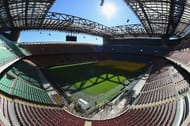
Widely considered by Italian historians as the greatest Italian to have played the game, Giuseppe Meazza scored 241 goals in 348 appearances, over 13 years at Inter Milan during his prime years.
Blessed with great technical skill, goalscoring prowess, and creative ability, he was nicknamed, "Il Genio" (the genius) by the Italian press during his career. With 216 Serie A goals to his name, Meazza won the Serie A top goal-scorer award on three occasions during his career and is fourth on the all-time Serie A goal-scoring charts.
Meazza is also one of four Italian men to have the World Cup twice in 1934 and 1938. The San Siro stadium as it commonly referred, home to Inter Milan and AC Milan is called the Giuseppe Meazza Stadium.
The stadium was re-named in 1980, recognising the Italian's achievements in Milan. A potent goal threat, the Milanese born forward notched numerous goals for various clubs during his 20-year career. An 80000 strong capacity seater, the stadium is one of Europe's most daunting venues to play with the hostile atmosphere created by the home fans.
